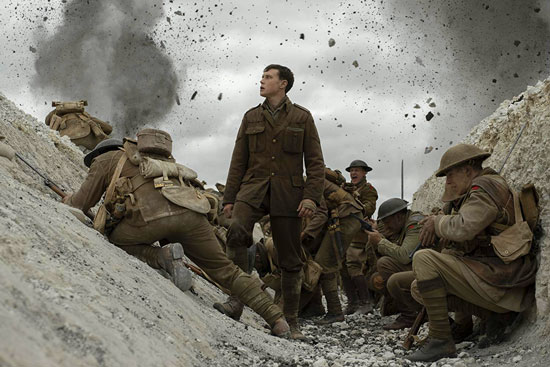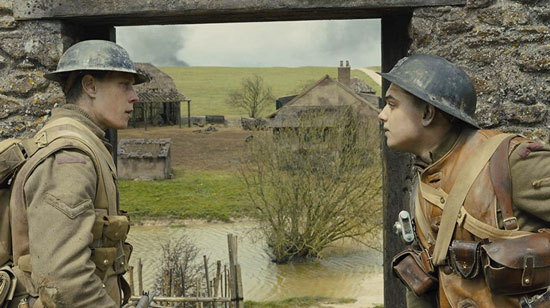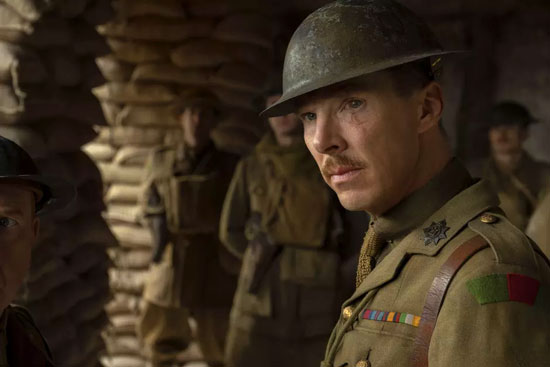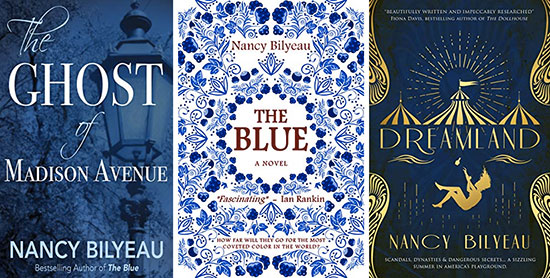Last Updated on January 6, 2020
At the height of the First World War, two young British soldiers, Schofield and Blake are given a seemingly impossible mission. In a race against time, they must cross enemy territory and deliver a message that will stop a deadly attack on hundreds of soldiers—Blake’s own brother among them.

To help keep this site running: Willow and Thatch may receive a commission when you click on any of the links on our site and make a purchase after doing so.
“1917” is winner of two 77th Golden Globes Awards: best Drama Motion Picture, and Director of a Motion Picture. In theaters everywhere January 10, 2020.
The power of friendship in the midst of war is at the center of “1917,” the harrowing yet beautiful movie directed by Sam Mendes. The plot of the film is simple—two young English soldiers must deliver a message to another unit along the front lines to warn them of a trap laid by the Germans—but the immense dangers they face in carrying out the mission push the two of them to the brink physically and emotionally.
Because Mendes’ choice was to film the movie in a series of elaborately choreographed tracking shots with few cuts, the viewer feels that he or she is alongside the characters, experiencing the shocks and dangers as they unfold. The immersive nature of “1917” gives the film much of its power while driving home the reality of the ghastliness of World War I, which left 17 million dead.
The story takes place in the spring of 1917. Soldiers in England and France went to war against Germany and Austria in the late summer of 1914 confident it would all be over by Christmas of that year. But here they are: The two sides have been locked in France in trench warfare for years, with all of its special horror. The Germans appear to be in retreat—“We’ve got them on the run,” exults one soldier—but the British discover through aerial photographs that in one section of the front it’s a deception. When 1,600 men of the Devons unit charge after what they think are retreating Germans, they’ll be annihilated.

At the film’s start, Lance Corporal Blake (Dean Charles Chapman) is sitting against a tree, dozing, when he’s told to pick one man and report to command. He grabs the man literally next to him, Lance Corporal Schofield (George MacKay), someone he’s friendly with, and they head off, grumbling about how hungry they are along the way. Schofield shares a bit of tasteless bread he’s squirreled away.
General Erinmore (Colin Firth) informs the two men that they are to travel through “no man’s land,” the barren, artillery-blasted, corpse-strewn section that exists between the two armies, to get to the Devons’ position and warn them before the planned offensive at dawn. The Germans have cut the telephone lines so there’s no choice but to send messengers on foot and it’s not a near destination. General Erinmore points out to Blake that his brother is with the Devons, poised to be massacred unless the warning gets through in time.
The film is a series of set pieces, starting in the trenches, moving through no-man’s-land, and pushing on through the remains of a farmhouse and a ravaged town and a river and so forth. The soldiers keep going, and the viewer goes along too. The entire film takes place in less than 24 hours.
With these constrictions, there is little time given to revealing the characters’ backgrounds or philosophizing about war. What comes through is subtle. Blake, “good with maps,” is a naturally upbeat young man, devoted to his family and relishing details from home like knowing all the different varieties of trees in his mother’s cherry orchard. Schofield, clever and resourceful, is more introverted and more emotionally damaged by the war, disclosing that he gave away a medal he won at the Battle of the Somme for a bottle of wine “because I was thirsty.”
While Schofield, not surprisingly, says he resents that Blake picked him for what looks like a mission they won’t survive, they are closely bonded through helping each other, not least through the hell-like no-man’s-land. The film unfolds a series of twists and shocks in what happens to the pair, which makes this an even tenser viewing experience. The fact that the actors are not well known strengthens authenticity, while the casting of Firth, Mark Strong, Richard Madden, and Benedict Cumberbatch in smaller roles enriches “1917.”

Amazing films have been made showing the experience of Germans in the world wars, such as Das Boot. This isn’t one of them. Following the approach of “1917,” which is to experience the story through the tight point of view of Blake and Schofield, the Germans are frightening and formidable enemies, leaping out of the shadows to kill them. “Even their rats are bigger,” laments Blake.
Mendes, director of “Skyfall”, “Spectre,” and “American Beauty,” has said in interviews that the idea for the film came from his grandfather, who fought in World War I, and told him when he was a small child about messengers along the front. He wrote the script with Krysty Wilson-Cairns, who read All Quiet on the Western Front to prepare.
Because the film takes place almost entirely outdoors, extensive sets were built for shooting, including over a mile of trenches in Salisbury Plains in England. The camera tracks the actors with few cuts, so the dialogue and action had to be minutely choreographed to fit the sets’ twisting and turning. Making the movie was in some ways like a play, agree actors, director Mendes, and cinematographer Roger Deakins. Moreover, the story takes place during primarily a cloudy day, so anytime the sun came out, shooting had to be halted.
But it is more than technical feats that make watching “1917” a deeply moving experience. It is the friendship that the characters feel for each other and the fleeting moments of appreciating life—a joke, a song, a fragrant blossom—amid one of modern man’s worst wars that will make the film linger long after leaving the cinema.
Nancy Bilyeau is a magazine editor and historical novelist. Her novel Dreamland and novella The Ghost of Madison Avenue take place in the 1910s in New York. For more information, visit her website.
If you enjoyed this post, you’ll want to wander over to The Period Films List. You’ll especially like the Best Period Dramas: First World War Era List. Also see our reviews for La France and Parade’s End.



Sophia Rose
January 19, 2020 at 1:04 pm (4 years ago)My husband loved this one. Great review!